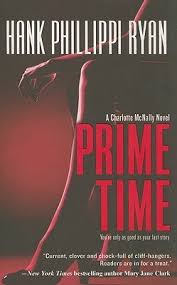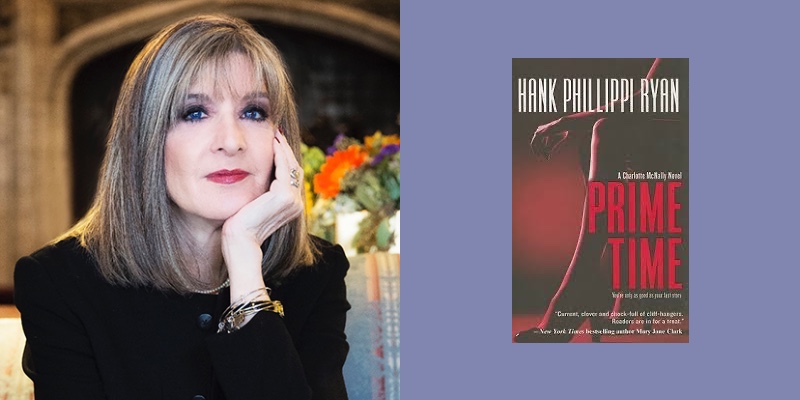“I’m a firm believer that things happen when the time is right,” says USA Today bestselling author Hank Phillippi Ryan. She should know. Her time to write psychological suspense didn’t arrive until she was 55 years old.
Ryan was in America’s early 1970s class of female broadcast pioneers along with Jane Pauley, Jessica Savitch, and Leslie Stahl. Long before she ever considered writing thrillers, she’d won the hearts of her viewers along with numerous Emmys for her investigative reporting on WTHR in Indianapolis, and in Atlanta and Boston.
Then one day in 2004, a spam email popped up on her computer screen at Channel 7 News, and by mistake, she opened it. The subject line said, “a new re-financing deal for you.” But the text seemed to be dialogue from a Shakespearean-era play.
“Why would someone send a spam email that millions receive, and few would open containing a Shakespearian line? My brain whispered to me: maybe it’s a secret message.”
And that brain began to crank into overdrive and conjured an idea for a novel. “At home that night I told my husband, and he was carefully skeptical. He said, ‘Sweetheart, do you know how to write a novel?’”
“How hard can it be?” she replied. “I’ve read a million of them.”
“I’ve since learned better, of course,” Ryan says. “I was the picture of naivete at that time. I somehow had infinite confidence that I could write a successful novel. Had I known how hard it is, I would have been much more daunted.”
And after being in the public eye as a television reporter for many years, “I thought it would be easy to find an agent.” She contacted two in the Boston area. One loved her writing and hated the plot. The other loved her plot and hated her writing.
“I was completely flummoxed. I can’t begin to tell you how thoroughly I didn’t know about what I was doing…but still, I had the audacious confidence I could write a book. My own possibly ridiculous obsession was the only thing that carried me through.”
One of her initial problems was her first draft manuscript. Printed out, it was 723 pages long—a five- or six-inch stack of paper.
“I edited it relentlessly. Took out everything that was repetitive, derivative, unoriginal, overwritten. I was ruthless in editing, something I learned in television. And I eventually discovered the book it was supposed to be.”
But not until it took up all of her spare time—she wrote nights and weekend and vacations. “My very supportive husband ate a lot of carryout salmon, I will admit…There was no easy road. There were a lot of tears and frustrations. Although after all those years as a reporter, I did have some training in writing and storytelling, I still needed to find my rhythm and my voice.”
And was it difficult switching to writing fiction after a long career as a journalist?
“That was my only true fear. I wondered if I could make stuff up! After years of using only the facts and the dialogue that other people actually used, I wondered if I could sit at my desk in my office looking out the bay window at the sugar maple tree, and somehow create an entirely new world.”
And what was that world? Her first effort was Prime Time, a psychological thriller about a middle-aged female television reporter feeling the pressure of aging in a young, beautiful-face profession. She stumbles upon (what else?) a spam email promoting a refinance opportunity and citing Shakespeare.
She submitted her revised manuscript to about twenty agents and four showed interest. Among those was Kristin Nelson, who became her agent. Nelson then submitted Ryan’s manuscript to various publishers. Editor Ann Leslie Tuttle with Harlequin at first rejected it, but a few days later called Nelson and told her she couldn’t get the story out of her head.
“She said she loved it, and she loved the character, but it was too ‘light’—too cute and too funny.” But Tuttle told Nelson the plot was so memorable that she wondered if Ryan could rewrite the whole thing with a more serious tone, avoiding the chick lit genre. Ryan did—rewriting and revising the entire novel with the same plot and character but with a ‘bigger’ style. It took her about a month of non-stop editing.
“She wanted it to feel like a big women’s’ fiction mystery,” Ryan says. “I can do that, I told her.” She got her first two-book deal for her efforts.
“Ann Leslie was trying to allow me to write the book she envisioned I was capable of writing…I wouldn’t be the place I am today had Ann Leslie not seen a hidden talent that she felt she could encourage and nurture so that I could write the best book possible.”
Tuttle was right. Prime Time went on to win the Agatha Award for Best First Novel from the Malice Domestic Convention. She’s been stacking up literary awards to go with all of those Emmys on her shelf ever since, now with five Agathas, five Anthonys, and the coveted Mary Higgins Clark Award.
Ryan describes her writing style as a complete pantser. “Just as in TV news, I’m going out in search of the story. If I knew the end of my investigations, they wouldn’t be news, right? So, in fiction, I’m comfortable allowing myself to discover what happens along the way.”
And what about her news stories? Today, after 43 years in TV, she picks and chooses them, and is only on the air from time to time. Her passion is now writing novels, although it’s obvious when you talk to her the investigative urge is still very much a part of her.
When she was about twelve, she read Nancy Drew books and later Agatha Christie. She and her sister would ride their ponies in rural Indiana to the local library, load up their saddle bags with books, and read for hours in the hayloft of the barn behind her house.
“At first, I thought maybe I should be a mystery writer, and write about detectives. Then I thought, no, I should be the detective!” And she did become an investigative reporter, uncovering crime and corruption, and always trying to solve the riddle. She studied Shakespeare in college and says she is still in awe of his story telling ability. Which is another reason the strange spam email caught her eye. What was Shakespearean dialogue doing in that message?
And it was on her first day of college where Harriet Ann Sablosky picked up the moniker Hank. A classmate said she didn’t look like a Harriet and called her Hank.
It stuck.
So, what is the biggest surprise of this second phase of her writing career?
“The publishing world is so different from TV world. As a television reporter, only one person can win and break the big story…but in the fiction writing world everyone can win, because one good book leads to another good book. So that’s been a new experience for me—how encouraging and supportive and enthusiastic my colleagues are. The community, the knowledge we’re all in this together, has really carried me through this second half of my life and career.”
“Things happen by luck and timing, and the right person at the right time seeing the right novel. That is so unpredictable, right? So, you have to keep putting one foot in front of the other –step by step and word by word—and you simply have to persevere.”
And she has.

___________________________________
Prime Time
___________________________________
Start to Finish: 18 months
I want to be a writer: Age 12
Decided to write a novel: Age 55
Experience: Television Investigative Reporter
Agents Contacted: About 20
Agent Rejections: About 16 (an 80% loss ratio)
First Novel Agent: Kristin Nelson, Kristin Nelson Agency
First Novel Editor: Ann Leslie Tuttle
First Novel Publisher: Harlequin
Inspiration: Agatha Christie, Tom Wolfe, Edith Wharton, Mark Helprin
Website: HankPhillippiRyan.com
Advice to Writers: The only thing you can control in the world of publishing is to write the best book you can. Stop comparing yourself to other writers. Stop worrying you’re not going do well enough. Concentrate on being the best writer you can be. It takes luck, timing, and an open mind to be ready for the next wonderful thing to happen.
Like this? Read the chapters on Lee Child, Michael Connelly, Tess Gerritsen, Steve Berry, David Morrell, Gayle Lynds, Scott Turow, Lawrence Block, Randy Wayne White, Walter Mosley, Tom Straw. Michael Koryta, Harlan Coben, Jenny Milchman, James Grady, David Corbett. Robert Dugoni, David Baldacci, Steven James, Laura Lippman, Karen Dionne, Jon Land, S.A. Cosby, Diana Gabaldon, Tosca Lee, D.P. Lyle, James Patterson, Jeneva Rose, Jeffery Deaver, Joseph Finder, Patricia Cornwell, Lisa Gardner, and Mary Kubica.

















